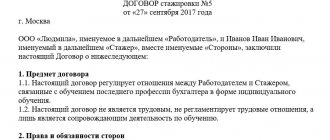Employers want employees to perform their duties well. But the needs of the enterprise change, and the functionality of employees has to be adjusted. Sometimes employees are forced to take on additional work, and not always in accordance with their specialization. Is the subordinate's consent required for additional duties? How to document this? Let's find out in this article.
The main employee went on sick leave. How to issue an assignment of additional work to perform his duties for another employee ?
Why assign responsibilities to an employee?
A defined circle of responsibilities once and for all is, unfortunately, a utopia. Life and production are complex and multifaceted; they constantly pose new challenges that need to be solved, including changing the responsibilities of employees.
There is only one goal: increasing the efficiency of the enterprise, minimizing costs and increasing income.
The reasons that most often force an employer to reconsider the responsibilities of his subordinates:
- the state has adopted new regulations, and it is necessary to bring the state into compliance with them;
- changes have occurred in the production process (new technologies, processes, equipment, etc. have appeared);
- the organization of work is changing;
- it is necessary to redistribute responsibilities between employees.
Documents regulating responsibilities
Logic dictates that these are the ones that will need to be amended when additional responsibilities are assigned.
- Employment contract. As Part 2 of Article 57 of the Labor Code states, it must indicate the work function of the person being hired - work in one or more specialties within the qualifications.
Naturally, a range of specific responsibilities is outlined. If this “circle” somehow changes, the employment contract will have to be adjusted. FOR YOUR INFORMATION! No one can oblige an employee to perform work that is not specified in the employment contract. All actions to change the main document are carried out exclusively with the prior consent of the employee 2 months before the planned changes in response to a written notification to management. - Job description. The employer can choose the duties it requires from the employee.
If the legal conditions set out in the employment contract, and most importantly, the work function, do not change, then the manager has the right to change the job description without taking into account the opinions of employees. IMPORTANT! Managers try to secure the goodwill of subordinates when changing their responsibilities, otherwise cooperation is unlikely to be effective and last long.
There are 2 options for creating a list of responsibilities:
- as an annex to the employment contract - then in case of any changes it will be necessary to conclude an additional agreement to the main document;
- as a local regulatory legal act - you can issue a modified version of the job description and ask the employee to endorse it: this will be evidence of his acceptance of new responsibilities.
The plaintiff filed a lawsuit against ZAO "XXX" to cancel the order dated... N... on the obligation to provide work stipulated by the employment contract and job description, the obligation to provide the necessary equipment and technical documentation to perform the work, citing the fact that the order dated... N ... he is entrusted with a duty not provided for by the employment contract and job description. As can be seen from the case materials, in violation of the requirements of labor legislation, the employer assigned the plaintiff to perform work not stipulated by the employment contract, knowing about the plaintiff’s disagreement to carry out this order, it decided to bring the plaintiff to disciplinary liability. The application of a disciplinary sanction for failure to fulfill duties not provided for in the employment contract is unfounded, and therefore the contested orders are illegal. View the court decision
NTVP "Kedr - Consultant"
LLC "NTVP "Kedr - Consultant" » Services » Legal consultations » Labor disputes » On the procedure for registering changes in the working conditions of an employee (combining professions, expanding service areas, performing the duties of a temporarily absent employee)
Questions:
What is the correct procedure to formalize a change in the working conditions of an employee: combining professions, expanding service areas, performing the duties of a temporarily absent employee (change of the employment contract, additional agreement to the employment contract, or issuance of an order)
How to properly cancel a surcharge if it is imposed by order?
Lawyer's answer
An employee may be assigned to perform additional work not provided for in the employment contract, subject to the requirements of Art. Art. 60.2, 151 Labor Code of the Russian Federation.
Guide to HR issues. How to change the essential terms of an employment contract {ConsultantPlus}
How to register a combination of professions (positions), expansion of service areas, increase in the volume of work (including when replacing an employee during vacation)
An order to perform additional work can be issued in the following order.
Step 1. Offering the employee additional work and obtaining his consent.
This offer can be made either orally or in writing. The law does not contain any requirements for its registration.
In Part 1 of Art. 60.2 of the Labor Code of the Russian Federation, which provides for the availability of written consent from the employee, does not establish a method for obtaining it. The employee can be asked to provide consent in one of the following ways:
— sign an agreement between the parties to perform additional work;
— make an appropriate inscription on the employer’s written proposal to perform additional work;
- submit a written application addressed to the head of the organization (his authorized person).
Guide to HR issues. How to change the essential terms of an employment contract {ConsultantPlus}
Step 2. Drawing up an order to perform additional work.
Instruction form for additional work
The Labor Code of the Russian Federation does not establish how to formalize the assignment of additional work to an employee.
The form of assigning additional responsibilities to certain categories of state civil servants is normatively determined. Labor legislation and other acts containing labor law standards apply to these categories of workers, taking into account the features provided for by the legislation on the state civil service (Part 7 of Article 11 of the Labor Code of the Russian Federation).
In this regard, the combination of positions of these categories of workers is formalized by an order, which specifies all the conditions for the combination, including the amount of additional payment (clauses 8, 9 of the Regulations on the combination of duties in the service in the internal affairs bodies of the Russian Federation, approved by the Decree of the Government of the Russian Federation of June 25 .2012 N 621, part 3 of article 34 of the Federal Law of November 30, 2011 N 342-FZ, clause 1.10.3 of the Order of the FAS Russia of October 4, 2007 N 317).
When assigning additional work to other employees, the deadline for completing such work, its content and volume are established by the employer with the written consent of the employee (Part 3 of Article 60.2 of the Labor Code of the Russian Federation), the amount of additional payment is by agreement of the parties to the employment contract, taking into account the content and volume of work (Part 3 of Article 60.2 of the Labor Code of the Russian Federation). 2, Article 151 of the Labor Code of the Russian Federation).
In practice, two ways to execute this order are used.
1 way . A separate written agreement is drawn up, which is not an integral part of the employment contract.
The arguments of supporters of using this method are as follows.
The terms of the employment contract determined by the parties do not change, since the employee is entrusted with additional work, the performance of which is not provided for by the employment contract, which follows from the systematic interpretation of the provisions of Art. Art. 60, 60.2 Labor Code of the Russian Federation. Thus, there is no actual change in the employment contract at the main place of work, since the performance and payment of additional work does not affect the performance and payment of the main job.
In addition, in parts 3, 4 art. 60.2 and art. 151 of the Labor Code of the Russian Federation provides for a special procedure for formalizing the assignment of additional work and refusing it, which differs significantly from the procedure for changing the terms of the employment contract established by Art. 72 Labor Code of the Russian Federation.
Method 2 . An additional agreement to the employment contract is drawn up.
The arguments of supporters of using this method are as follows.
The indication of the labor function (labor duties performed by position, profession) of the employee is included in the mandatory conditions of the employment contract (paragraph 3, part 2, article 57 of the Labor Code of the Russian Federation). Changing the terms of an employment contract determined by the parties is possible only by agreement of the parties, drawn up in writing (Article 72, Part 1 of Article 74 of the Labor Code of the Russian Federation). Since when an employee is assigned additional work, the conditions determined by the parties change (expanding the range of the employee’s job responsibilities or increasing the volume of his work), it is necessary to conclude an additional agreement to the employment contract.
Guide to HR issues. How to change the essential terms of an employment contract {ConsultantPlus}
Please note that the employer has the right to adhere to any of the considered methods.
The following argument can be made in favor of this conclusion. The Kostroma Regional Court, in its cassation ruling dated February 13, 2012 in case No. 33-36, indicated that the use in accordance with Art. 60.2 of the Labor Code of the Russian Federation of one form or another of an agreement to perform additional work does not indicate the invalidity or non-conclusion of this agreement.
If this agreement provides for all the necessary conditions for performing additional work, there will be grounds for holding the employer liable under Art. 5.27 of the Code of Administrative Offenses of the Russian Federation will not exist.
It is advisable to draw up the agreement in two copies, each of which must be signed by the parties. One copy is given to the employee, the other (with the employee’s signature indicating receipt of the document) remains with the employer.
Conditions for performing additional work
In the agreement of the parties on the performance of additional work, the following conditions must be specified (parts 1 - 3 of article 60.2, article 151 of the Labor Code of the Russian Federation):
— on assigning additional work to an employee with his written consent;
- position (profession) for which the employee is assigned additional work;
— content of the work;
- its volume;
— the period during which such work will be performed;
- amount of surcharge.
Guide to HR issues. How to change the essential terms of an employment contract {ConsultantPlus}
Step 3. Issuing an order to assign additional work.
A unified form of such a document is not provided for by law, so the employer has the right to develop it independently.
It is advisable to indicate in the order (parts 1 - 3 of article 60.2, article 151 of the Labor Code of the Russian Federation):
— type of additional work;
- its content;
- deadline;
- the amount of additional payment for its implementation.
As a basis for issuing an order, reference should be made to the relevant agreement on the performance of additional work.
The employee must be familiarized with the order and signed.
Guide to HR issues. How to change the essential terms of an employment contract {ConsultantPlus}
Termination of combination of professions (positions), expansion of service areas, increase in the volume of work
Termination of additional work upon expiration of its deadline
Additional work is carried out within the period agreed upon by the parties, which follows from Part 3 of Art. 60.2 Labor Code of the Russian Federation. After the end of the specified period, the obligations of the parties associated with the assignment of this work automatically terminate.
The law does not provide for the execution of any documents in this case. Nevertheless, it is advisable for the employer to issue a special order for the accounting department, according to which payments to the employee related to the assignment of additional work must be stopped. This will avoid overpayment of funds.
Early termination of additional work
The law also provides for the right of the employer and employee to unilaterally cancel additional work ahead of schedule or refuse to perform it (Part 4 of Article 60.2 of the Labor Code of the Russian Federation). To do this, the interested party is obliged to notify the other party no later than three days before the expected termination of additional work (Part 4 of Article 60.2 of the Labor Code of the Russian Federation). Obtaining the consent of the other party for early termination of additional work is not required.
In case of early termination of additional work, the following procedure can be envisaged:
Step 1. Notification of early termination of additional work.
If the initiative comes from the employee, he sends the employer a written statement refusing to perform additional work.
If the employer is interested in stopping additional work, he sends a notice to the employee.
To avoid controversial situations in the future, the employer is recommended to familiarize the employee with such a notice against signature. If the employee refuses to familiarize himself, it is necessary to draw up a corresponding report.
This will allow the employer to prove that he canceled the order to perform additional work in compliance with the requirements of Part 4 of Art. 60.2 Labor Code of the Russian Federation. Consequently, the employer is not obliged to pay for work that the employee performed on his own initiative after the order was properly canceled.
Step 2. Issuance of an order (instruction) to cancel additional work.
Although the law does not provide for any requirements for the content of the document, it is advisable to issue this order in writing. It must indicate the date from which additional work will cease to be performed. The employee must be familiarized with the document and signed.
Guide to HR issues. How to change the essential terms of an employment contract {ConsultantPlus}
Selection of documents:
Form: Additional agreement to the employment contract. Combination of positions (sample) (Prepared by ConsultantPlus specialists, 2018) {ConsultantPlus}
Form: Order to cancel additional work due to combining positions (filling sample) (Prepared by ConsultantPlus specialists, 2018) {ConsultantPlus}
The explanation was given by Igor Borisovich Makshakov, legal consultant of LLC NTVP Kedr-Consultant, October 2018.
When preparing the answer, SPS ConsultantPlus was used.
This clarification is not official and does not entail legal consequences; it is provided in accordance with the Regulations of the CONSULTATION LINE ().
Additional responsibilities within one position
No regulatory documents other than the recommendations of Rostrud say how to draw up job descriptions, so their preparation is voluntary for the employer, and the form is arbitrary. Almost everyone still prefers to draw them up, since this document:
- significantly simplifies the organization of work;
- resolves possible disagreements regarding the work being performed;
- delineates responsibility;
- eliminates duplication of similar functions;
- is compiled not subjectively “for the employee”, but “for the position”, no matter who occupies it.
REFERENCE! When determining the responsibilities of a particular position, the Unified Tariff and Qualification Directory of Works and Professions is taken as a basis. Many of its provisions are outdated, and employers often need new positions that are not reflected in it. In such cases, local executive authorities may adopt regulations on the requirements for a particular position.
Managers can determine the content of the job description themselves, therefore, within the same position, they can add additional responsibilities to it, if such are:
- fit into the qualification characteristics;
- due to technical reorganization of the enterprise;
- caused by changes in working conditions.
IMPORTANT INFORMATION! If the reason for the changes is changes in technical and/or organizational working conditions, the employee must learn about this 2 months in advance (Part 2, Article 74 of the Labor Code). The employee’s consent is not required, but it is his right to be informed in a timely manner.
In all other cases, it is necessary to draw up an additional agreement to the employment contract, providing for the mandatory consent of the employee.
Two ways to assign responsibilities to additional positions
There are various reasons when an employer or employee may need to change the terms of reference. For example, a position is being reduced, and another competent employee agrees to take on a new activity for additional pay. Or the employer wants the employee to perform additional functions for which he has enough working time (for example, a courier can receive calls while in the office).
The Labor Code of the Russian Federation sets out 2 options according to which an employee can be assigned new responsibilities: internal part-time work and combination work . When choosing the first or second, the employer focuses on whether specific hours can be allocated for additional duties, or whether they are distributed differently during working hours.
The characteristics and differences of these two methods are shown in the table.
| COMBINATION | INTERNAL COLLABORATION |
| Additional duties are performed in parallel with the main job. | Additional duties involve completing the main job first. |
| Working hours do not increase. | Working hours are increased (up to a maximum of half a working day, but not more than 4 hours a day). |
| Payment as agreed with the employer. | Payment is proportional to time worked. |
| An additional agreement to the current employment contract and a change in the job description are required. | It is necessary to conclude another employment contract with this employee - for an additional position at part of the salary. |
| Additional duties can be removed at any time by order of management. | To remove additional responsibilities, you must terminate the relevant employment contract. |
It is up to the employer to decide which method is preferable in a particular situation.
In case of oral agreements
Verbal agreement to assign responsibilities to an employee
An oral agreement allows you to avoid many formalities. The manager will not have to spend a lot of time on documentation.
But such agreements protect the employee least of all from a legal point of view. After all, the job description is not adjusted, and the salary is not recalculated.
That is, an employee has two staff units at once. And he has no additional remuneration.
An employee has every right to refuse to take over the duties of someone who is currently on leave. But it often happens that after a refusal, the employer threatens to fire you.
But in such a situation, the law is on the side of the subordinates. If dismissal does occur, then you have every right to go to court in order to protect your rights. If the outcome of the case is positive, the citizen is reinstated to his position without any problems.
Step-by-step plan for assigning additional responsibilities
- Notify the employee in writing 2 months in advance of changes in working conditions.
- Issue a decree (order) on part-time work, internal part-time work, or an order on the assignment of additional responsibilities.
- Draw up an additional agreement to the employment contract or conclude an additional contract.
- Republish the job description and familiarize the employee with its new edition for signature.
If the employee is against
The introduction of new duties into the job description, if they are within the scope of qualifications, does not require the consent of the employee, so disagreements are often possible on this point, especially since wages in such cases are usually not revised. What should an employer do if, in response to his notice of an upcoming change in working conditions, an employee expresses disagreement with working under the new rules?
The employer must offer the person who disagrees in writing another position in accordance with his qualifications, even if it is of a lower rank or less paid, if it is vacant. If there are no such positions or disagreement follows again, the employee has the right to dismiss (clause 7, part 1, article 77 of the Labor Code).
Another option is when the terms of the employment contract are changed unilaterally. According to Part 1 of Article 72 of the Labor Code of the Russian Federation, this can be equated to a transition to a new job, for which the written consent of the employee is required. If the employer insists under threat of dismissal, the subordinate can take the following measures:
- ask in writing for an increase in pay for the new duties assigned;
- if it was not possible to reach an agreement, contact the labor inspectorate or the trade union (you must attach a copy of the main documents and the order imposing new duties);
- In case of illegal dismissal, the court will protect his rights.
Is it possible to assign additional responsibilities to an employee without his consent ?
So, to impose additional responsibilities, it is better to obtain the consent of the employee, notify him in time and draw up the necessary documents, making changes to the employment contract or job description, and, if necessary, concluding an additional agreement.
Temporary transfer and combination: features
This translation is one of the most convenient design options in such situations. The timing of temporary transfers usually depends on the reason.
For example, you can establish that the performance of new duties ends when the main employee returns from vacation. In some cases, this does not even require consent from the employee. For example, when there is a general production need.
Combinations are usually formalized if key employees go on maternity leave or long vacations. This is where Article 60.2 of the Labor Code comes to the rescue.
It is assumed that the part-time worker performs both his main job and additional work. This period is usually also associated with the following concepts and phenomena:
- Recalculation of wages, upward.
- Significant expansion of the service area.
- Increasing the direct volume of work.










